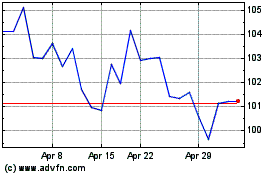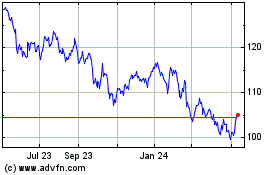Cat-Litter Rivals Pounce on New Shipping Strategies -- 2nd Update
October 13 2019 - 4:39PM
Dow Jones News
By Sharon Terlep
Cat-litter companies worked to make their products fresher, less
dusty and easier to clean. Now they are chasing a new goal: moving
those products more cheaply.
Clorox Co., the No. 2 U.S. litter maker, with brands including
Fresh Step and Scoop Away, plans to build an East Coast factory to
cut costs of transporting litter as the company struggles to
compete with faster-growing rivals. Meanwhile, Nestlé SA -- maker
of Tidy Cats, the top-selling U.S. brand -- is spending millions to
upgrade a Missouri factory with technology that will lower
transportation and inventory-management costs.
The more than $2 billion market for litter is a lucrative piece
of the fast-growing pet industry because it is essential to owning
an indoor cat, and owners are willing to pay more for advances that
cut down on the smell and hassle involved in keeping
feline-friendly homes clean. Leading brands promise to contain the
smell of multiple cats, slide easily from the box during cleaning,
and prevent litter from being tracked through the home, among other
claims.
"[Litter sales] tend to grow over time through innovation," said
Church & Dwight Co. finance chief Rick Dierker. "People will
pay a premium."
But the high cost of producing, shipping and delivering the
heavy product has vexed both manufacturers and retailers,
particularly as consumers increasingly prefer online shopping and
home delivery.
Cat litter is usually made from either clay or
moisture-absorbing silica crystals, similar to those found in
pouches to preserve food and medications. A typical box or bag of
litter weighs 30 to 40 pounds, though crystal-based litter can be
lighter and several brands have lightweight options. Clorox's
"Fresh Step Lightweight Simply Unscented" is about 30% lighter than
its normal-weight counterpart, while Nestlé's "Tidy Cats
LightWeight" weighs half as much, according to the companies.
Amazon.com Inc. has an advantage selling litter online over
retailers such as PetSmart Inc. and Chewy Inc. because it can
bundle a range of products in the same shipment to offset the high
cost of delivering heavy bags of dog food or cat litter. Amazon has
since discontinued its in-house AmazonBasics litter offering.
Amazon didn't respond to a request for comment.
Nestlé has four cat-litter factories, including one in
Springfield, Mo., that makes litter from recycled material. The
company is spending $115 million to expand another Missouri plant
to meet growing demand and an additional $55 million on an
automated, digitally controlled system of moving pallets in, out
and around the warehouse, which it says will cut handling and
transportation costs.
Sales of cat litter, a $2.6 billion industry in the U.S., rose
4% in 2018 from a year earlier, according to Euromonitor. Clorox
has trailed the broader market. Its litter sales increased 3% in
the period, while sales of Church & Dwight's Arm & Hammer
and Feline Pine brands rose 8%.
Americans own fewer cats but are spending more money overall on
their pets. Roughly 25% of households included a cat in 2018, down
from 30% in 2012, according to the American Veterinary Medical
Association. Households had 1.8 cats on average in 2018, compared
with 2.1 in 2012. Owners of all pets spent $16 billion on supplies
in 2018, up 6% from a year earlier, the American Pet Products
Association says.
In a recent presentation to investors, Clorox product-supply
chief Andrew Mowery highlighted the company's "litter network," in
which litter is shipped nationwide from a single factory in Spring
Hill, Kan. The company plans to invest in the litter business, he
said, and to do so without a new factory "would ignore the
opportunity to eliminate transportation miles."
Mr. Mowery said Clorox expects its new litter factory to be
complete in two years. He said Clorox would cut 7 million miles a
year off the distance driven to deliver litter, saving 1 million
gallons of diesel fuel. He didn't specify the expected cost of the
factory, how many people it would employ or where it would be
located on the East Coast.
The Oakland, Calif.-based company behind Glad trash bags,
Kingsford charcoal and Clorox cleaning products is the only major
litter producer with a single U.S. plant. Like Nestlé, Church &
Dwight also has multiple litter factories, which are costly to
build because of the machinery and equipment required to make
litter, analysts say.
A Clorox spokeswoman said the new plant will accommodate growth
and new litter varieties.
The litter discussion was part of presentations by Clorox
executives to Wall Street analysts in which the company laid out a
plan to cut costs and jump-start growth. Clorox's growth has lagged
behind rivals' in recent quarters and raised questions on Wall
Street over whether the company needs to consider a bigger strategy
shift. Clorox shares are up 5.7% in the past year.
Write to Sharon Terlep at sharon.terlep@wsj.com
(END) Dow Jones Newswires
October 13, 2019 16:24 ET (20:24 GMT)
Copyright (c) 2019 Dow Jones & Company, Inc.
Nestle (PK) (USOTC:NSRGY)
Historical Stock Chart
From Mar 2024 to Apr 2024

Nestle (PK) (USOTC:NSRGY)
Historical Stock Chart
From Apr 2023 to Apr 2024
